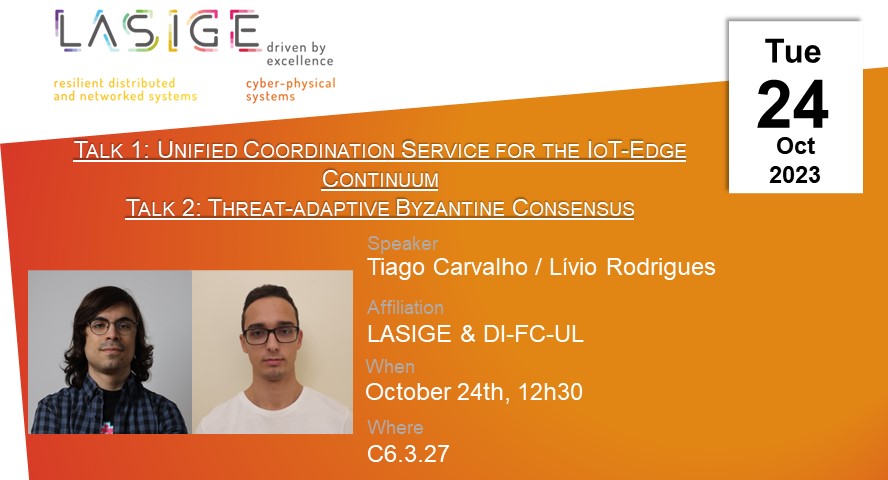Speakers: Tiago Carvalho (LASIGE, DI/FCUL) and Lívio Rodrigues (LASIGE, DI/FCUL)
Date: October 24, 2023, 12h30
Where: C6.3.27
Date: October 24, 2023, 12h30
Where: C6.3.27
Talk 1: Unified Coordination Service for the IoT-Edge Continuum
Abstract: Complex Internet of Things (IoT) applications are typically composed of many devices and servers that differ significantly in their hardware and software capabilities. Due to the large number and heterogeneity of these components and their constant change of state, regulating and coordinating IoT interactions is a significant concern. Simultaneously, there is also the problem of ensuring that joining devices satisfy the security requirements defined for critical IoT applications. In addition, due to the potential mobility of devices, meeting the strict performance requirements of IoT applications becomes difficult. However, existing work focuses on tackling these issues separately, and no complete solution exists. In this work, we aim to address them holistically by designing, implementing, and evaluating a service to simplify the deployment and management of IoT applications in the IoT-edge continuum. The solution will support remote attestation, extensible coordination, confidentiality, key distribution, and orchestration in a Byzantine fault-tolerant implementation.
Talk 2: Threat-adaptive Byzantine Consensus
Abstract: Blockchain technology has sparked renewed interest in planetary-scale Byzantine fault-tolerant (BFT) state machine replication (SMR). While recent works have mainly focused on improving the scalability and throughput of these protocols, few have addressed latency. In this talk I will present FLASHCONSENSUS, a novel transformation for optimizing the latency of quorum-based BFT consensus protocols. FLASHCONSENSUS uses an adaptive resilience threshold that enables faster transaction ordering when the system contains few faulty replicas. Our construction exploits adaptive weighted replication to automatically assign high voting power to the fastest replicas, forming small quorums that significantly speed up consensus. Our experimental results show that FLASHCONSENSUS can order transactions with finality in under 0.4s, which is half the time a PBFT-like protocol takes in the same network and even less than this protocol running on the theoretically best possible internet links (transmitting at 67% of the speed of light). By reducing latency, we can make BFT-based systems more responsive, improving the user experience and the overall effectiveness of these systems.
Short-bios:
Tiago Carvalho is a PhD student working under the supervision of Prof. Alysson Bessani and Prof. António Casimiro to develop a unified solution for the IoT-edge continuum. Tiago also attends the European-funded VEDLIoT project since 2021.
Lívio Rodrigues My name is Lívio Rodrigues, and I am 24 years old. I hold a Bachelor’s degree in Computer Engineering from the Faculty of Sciences of the University of Lisbon, where I’m enrolled. Currently, I am waiting to defend my Master’s thesis, which focused on improving the latency of Byzantine fault-tolerant protocols in large-scale systems, under the supervision of Professor Alysson Bessani and Professor Vinicius Cogo. My primary areas of interest revolve around reliable distributed systems, state machine replication, and Byzantine fault-tolerant protocols.
